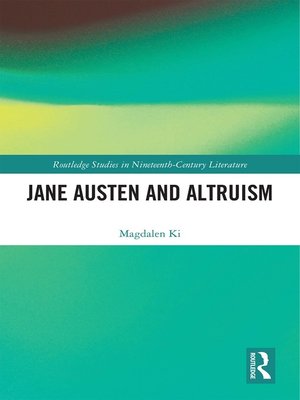
Sign up to save your library
With an OverDrive account, you can save your favorite libraries for at-a-glance information about availability. Find out more about OverDrive accounts.
Find this title in Libby, the library reading app by OverDrive.



Search for a digital library with this title
Title found at these libraries:
| Library Name | Distance |
|---|---|
| Loading... |
Jane Austen and Altruism identifies a compelling theme, namely, the view that Jane Austen propounds a rigorous, boundary-sensitive model of altruism that counters the human propensity to selfishness and promotes the culture of cooperation. In her days, altruism was commonly known as "benevolence", "charity," or "philanthropy", and these concepts overlap with Auguste Comte's later definition of altruism as "otherism". This volume argues that Austen's thinking co-opts the evolutionary idea that altruism is seldom truly pure, egoism cannot be eradicated, and boundless group altruism is not sustainable. However, given that she comes from a naval and clergy family, she witnesses the power of wartime patriotism, the Evangelical revival, the Regency culture of politeness, and the sentimental novels. In her novels, she locates human relationships along an altruism continuum that ranges from enlightened selfishness to pathological altruism. Unconditional love is hard to find, but empathy, kin altruism, reciprocal exchange, and group altruism are key to the formation of self-identity, family, community and the nation state.







